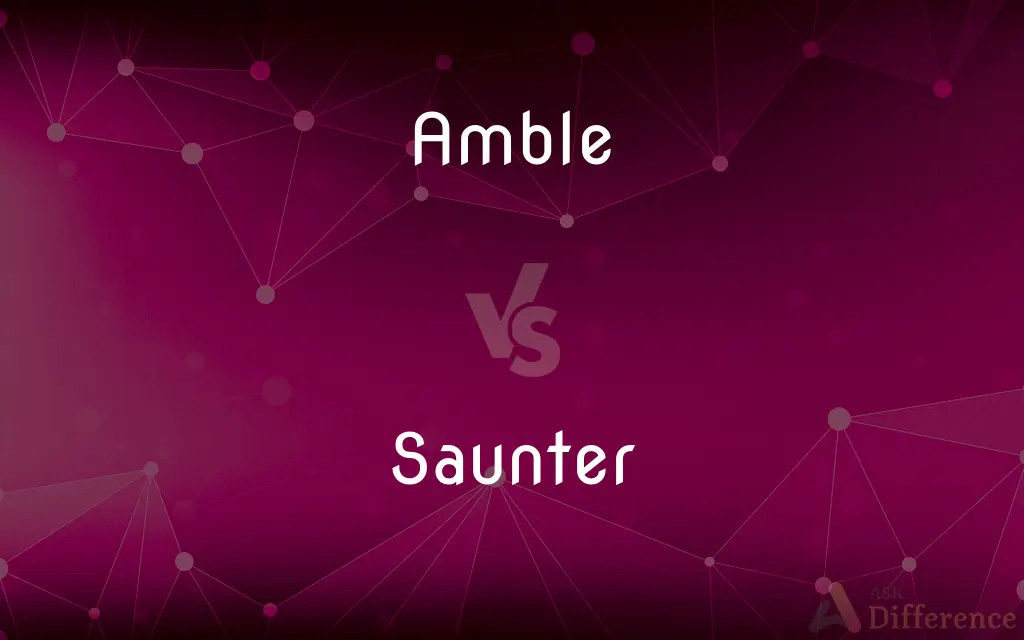Amble vs. Saunter — What's the Difference?
By Fiza Rafique & Urooj Arif — Updated on April 27, 2024
Amble refers to walking at a slow, relaxed pace, typically leisurely and easy; saunter implies a leisurely stroll but with a more casual, often nonchalant or aimless attitude.

Difference Between Amble and Saunter
Table of Contents
ADVERTISEMENT
Key Differences
Amble describes a manner of walking that is slow and relaxed, often associated with enjoying one's surroundings without any rush. This gait is gentle and typically seen in contexts where one is taking in the scenery. On the other hand, saunter not only involves a leisurely pace but also connotes a casual and sometimes aimless walk, often characterized by a lack of urgency and a seemingly indifferent attitude toward one’s destination.
While ambling might be chosen for relaxation or physical ease, sauntering carries a stronger implication of attitude it suggests a certain confidence or contentment in taking one's time. Whereas ambling is primarily about pace, sauntering is also about the demeanor one exhibits while walking.
In literature, to amble often describes a character's movement in a way that evokes calmness and contentment, reflecting a peaceful state of mind. Meanwhile, to saunter might be used to describe a character who is more laid-back or who displays an air of independence and detachment from their surroundings.
Ambling can be common in rural or scenic areas where the emphasis is on enjoying the environment. Sauntering, however, might be more typical in urban settings or social contexts where one’s stroll can also be a form of display, showing off one's ease and confidence in the setting.
Both ambling and sauntering are forms of walking that contrast with hurried or purposeful walking styles. However, the choice of one over the other can subtly change the description of a scene or person, suggesting either a simple relaxed pace or a relaxed pace combined with a casual, possibly aloof attitude.
ADVERTISEMENT
Comparison Chart
Definition
Walking at a slow and relaxed pace.
Walking leisurely with a casual or aimless attitude.
Connotation
Neutral or positive, implying relaxation.
Often casual with an element of nonchalance.
Focus
On the pace of walking.
On both pace and attitude.
Common Usage
Enjoying surroundings, leisurely activities.
Displaying ease, sometimes aimlessness.
Literature Depiction
Evokes calmness and contentment.
Suggests confidence, independence, or detachment.
Compare with Definitions
Amble
A leisurely way of walking with no apparent haste.
His amble along the beach at sunset was a daily ritual.
Saunter
To exhibit nonchalance and ease while walking.
With a saunter, he crossed the street, ignoring the bustling city around him.
Amble
A stroll taken at one's leisure.
After dinner, they took a gentle amble around the neighborhood.
Saunter
To walk with an air of casualness and detachment.
They sauntered through the festival, taking in the sights and sounds without urgency.
Amble
To move at a pace comfortable for soaking in the surroundings.
We ambled through the historic streets, marveling at the architecture.
Saunter
To walk in a slow, relaxed manner, often with a slight swagger.
He sauntered into the room as if he had all the time in the world.
Amble
A gentle, easy gait typical of a relaxed walk.
The old couple's amble down the road reflected years of comfortable companionship.
Saunter
A leisurely stroll, possibly without a clear destination.
She took a saunter around the block to clear her mind.
Amble
To walk slowly and with relaxed movements.
They ambled through the park, enjoying the sunny afternoon.
Saunter
A casual way of walking that may show confidence or indifference.
She sauntered along the beach, lost in her thoughts.
Amble
Amble is a town on the North Sea coast of Northumberland, England, at the mouth of the River Coquet; Coquet Island is visible from its beaches and harbour. In 2011, it had a population of 6,025.
Saunter
To walk at a leisurely pace; stroll.
Amble
To walk slowly or leisurely; stroll.
Saunter
A leisurely pace.
Amble
To move along at an easy gait by using both legs on one side alternately with both on the other. Used of a horse.
Saunter
A leisurely walk or stroll.
Amble
An unhurried or leisurely walk.
Saunter
To stroll, or walk at a leisurely pace.
Amble
An easy gait, especially that of a horse.
Saunter
A leisurely walk or stroll.
Amble
An unhurried leisurely walk or stroll.
Saunter
A leisurely pace.
Amble
An easy gait, especially that of a horse.
Saunter
(obsolete) A place for sauntering or strolling.
Amble
(intransitive) To stroll or walk slowly and leisurely.
Saunter
To wander or walk about idly and in a leisurely or lazy manner; to lounge; to stroll; to loiter.
One could lie under elm trees in a lawn, or saunter in meadows by the side of a stream.
Amble
(intransitive) Of a quadruped: to move along by using both legs on one side, and then the other.
Saunter
A sauntering, or a sauntering place.
That wheel of fops, that saunter of the town.
Amble
To go at the easy gait called an amble; - applied to the horse or to its rider.
Saunter
A careless leisurely gait;
He walked with a kind of saunter as if he hadn't a care in the world
Amble
To move somewhat like an ambling horse; to go easily or without hard shocks.
The skipping king, he ambled up and down.
Sir, your wit ambles well; it goes easily.
Saunter
A leisurely walk (usually in some public place)
Amble
A peculiar gait of a horse, in which both legs on the same side are moved at the same time, alternating with the legs on the other side.
Saunter
Walk leisurely and with no apparent aim
Amble
A movement like the amble of a horse.
Amble
A leisurely walk (usually in some public place)
Amble
Walk leisurely
Common Curiosities
Which is more positive, amble or saunter?
Amble generally has a more universally positive connotation, focusing on relaxation and enjoyment, while saunter can sometimes imply aimlessness or detachment.
Can amble and saunter be used interchangeably?
While similar, they aren't perfect synonyms; saunter carries connotations of attitude and style that amble does not.
How does the setting influence the choice between amble and saunter?
The choice might depend on context: amble is more about enjoying scenic or peaceful surroundings, while saunter might be more about attitude and presence in a social or urban environment.
What is the main difference between amble and saunter?
Amble focuses on a slow, relaxed pace, ideal for relaxation, whereas saunter includes a casual, often aimless attitude in addition to a leisurely pace.
Is sauntering considered stylish or lazy?
Sauntering can be seen as stylish due to its association with ease and confidence, but it might also be perceived as lazy in a more goal-driven context.
What does it say about a character in a story if they saunter?
It might suggest that the character is confident, independent, and perhaps a bit detached from the urgency of their environment.
Can one switch from ambling to sauntering in the same walk?
Yes, a person could start by ambling in a relaxed manner and shift to sauntering as their mood or the social context changes.
What type of personality might prefer to saunter?
A more laid-back, confident individual who enjoys displaying their casual approach to life might prefer to saunter.
What type of personality might prefer to amble?
Someone who values relaxation, peace, and taking in their environment might prefer to amble.
How should writers choose between describing a walk as an amble or a saunter?
They should consider whether they want to emphasize just the relaxed pace or add an element of casual, nonchalant attitude to the description.
Share Your Discovery

Previous Comparison
Dude vs. Guy
Next Comparison
Itinerant vs. ItineraryAuthor Spotlight
Written by
Fiza RafiqueFiza Rafique is a skilled content writer at AskDifference.com, where she meticulously refines and enhances written pieces. Drawing from her vast editorial expertise, Fiza ensures clarity, accuracy, and precision in every article. Passionate about language, she continually seeks to elevate the quality of content for readers worldwide.
Co-written by
Urooj ArifUrooj is a skilled content writer at Ask Difference, known for her exceptional ability to simplify complex topics into engaging and informative content. With a passion for research and a flair for clear, concise writing, she consistently delivers articles that resonate with our diverse audience.














































